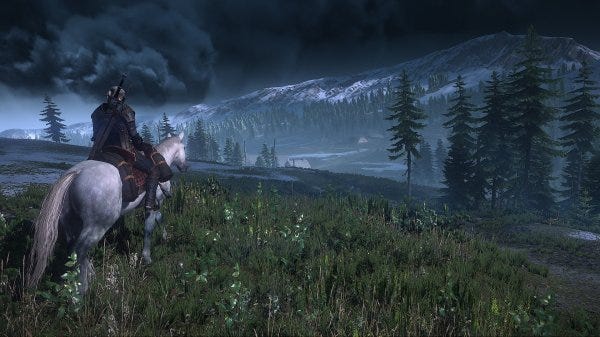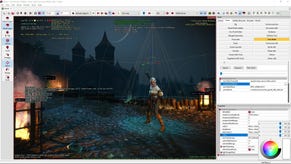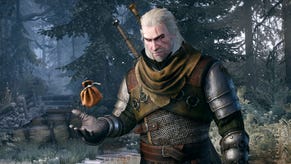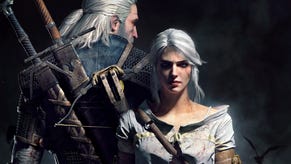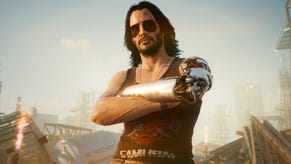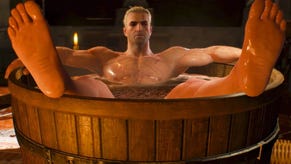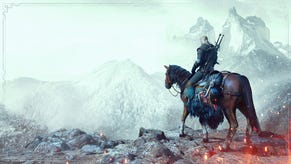CD Projekt On The Witcher 3's Open World, Beards
"More Witcher-ish than ever before"
Good news! Better news. Best news. Geralt is back, and he's realized that he's capable of doing more than just moving ever-onward in a straight line. The Witcher 3: Wild Hunt sees gaming's favorite silver-haired sourpuss return with a heart full of purpose, a beard ripe from mighty mutant brooding, and - most excitingly - a fully open world teeming with possibilities. But why? What does the beard mean? Can we talk to it? Oh, and also the open world, I guess. How's that work? I got in touch with CD Projekt senior quest designer Jakub Rokosz and (thankfully un-assassinated) marketing king Michał Platkow-Gilewski to find out everything. Or, well, most things - for instance, how Witcher 3's world will stack up to Skyrim's, where traditional Witcher storytelling fits into that, how far-reaching the impacts of our choices will be, what sorts of people and locations we'll encounter, and heaps more.
Make a break for the break. Otherwise, this intro will never end. (Warning: Beware of minor Witcher 2 ending spoilers.)
RPS: I’d like to start with the most important question. Why does Geralt have a beard now?
Michał Platkow-Gilewski: [laughs] That’s a tough question. When it came to redesigning the character, we made a survey of the company. We asked all the girls here, what’s the sexiest thing about the guys in the office? They all said the beards are the sexiest. So we came up with this breakthrough design change and added the beard. No, just joking. A few months have passed. Geralt is on the road, you could say?
Jakub Rokosz: Right now he’s pretty much a man left on his own, after what happened in Witcher 2. He basically wanted to get a little alone time. I think the beard signifies that, that he spent some time in the wild. He didn’t really have to worry about looking good for the ladies out there.
RPS: It’s an interesting dichotomy to set him loose in an open world like this. I mean, you've been saying that getting his memories back has made him more focused than ever on his main goal. It seems like he has something he really wants to do now, as opposed to just wandering. Why did you decide to use an open world to tell that story?
Jakub Rokosz: To be honest, we always loved the narrative part of the Witcher series. We really like the way we tell the story. But we always felt that we were restricted by the way we allowed the player to travel to locations. They were always small, closed locations. We knew that if we wanted to give you the feeling of Geralt searching for his meaning and knowing the world, this wouldn’t work. The open world was the only right approach for this, to be honest. Geralt, right now, after two games and restoring his memory and stuff, I think he needs to find himself again. This is part of his journey as well.
RPS: Also, there’s a war going on now. How does that affect the open world? Are there actual battles, or is it more that you just see the ramifications of the war?
Michał Platkow-Gilewski: Depending on the region, you’ll see other effects of the war. When you’re traveling through the open world, you’ll see places just after the armies have marched through. Places destroyed by the war. In different places you’ll see people talking about the war as a chance to maybe gain some wealth.
Jakub Rokosz: Or they’ll talk about it as if it’s something really far away that won’t actually happen to them.
Michał Platkow-Gilewski: Yeah. War will be present - maybe not at every single step, but almost everywhere – in different ways, depending on how far from the actual fighting, the front lines, you might be. It depends on who you talk to. Maybe a small community will have other problems on their hands apart from the war, which is far away.
RPS: Will there ever be any points, just roaming around the open world, where massive-scale battles - presumably related to the war - break out?
Michał Platkow-Gilewski: I don’t know if we really want to get into those kinds of details right now. I might spoil something. But what I can say is that there will be heavy combat events. They will be executed better than in Witcher 2.
RPS: In other interviews, you've noted that you're paying close attention to the strengths and weaknesses of worlds like Skyrim. How so, though? Where do you think Bethesda and others most need to improve?
Michał Platkow-Gilewski: It’s hard not to mention Skyrim, but I believe that our approach to our game is totally different. What they created was an open-world RPG. What we’re doing is a story-driven RPG set in an open-world environment. For us, the most important aspect of the game is always the story. And by “story” I mean not only what’s happening, but also the choices and consequences, the moral gray areas, the good or bad characteristics of the NPCs that make them believable. After you meet them, you’ll remember who they are and why they do what they do. All that is the most important thing for us.
But this time we wanted to put all of that in an open world. It’s a big challenge, but we’ve identified all the tricky parts of it, and we’re working hard to give a great storytelling experience in this open world. As far as asking what will be the consequences of your actions, there will be a lot of them. You know Witcher 2. We want to bring all of our experience in this field and put it in an open-world environment. Bigger and smaller actions will all bring you to small or huge consequences.
It’s enough to tell you that we’re preparing three totally different epilogues depending on how you finish the game, with different choices somewhere in the middle. There will be 36 different states you can leave the world in. By states, I mean more significant changes, not every single change you’re involved in.
RPS: How do you a tailor an open world to be conducive to really good storytelling? In general, they’re best for player-driven types of things. When you’re trying to tell a player a story, how do you change open world design?
Jakub Rokosz: In our case, in The Witcher’s case, it helps in some fields. One of the biggest problems we had in The Witcher 2 is that to keep pace between the story and the game itself, we had to sometimes overload the player with information. Just so they could understand the mechanics and the world and the consequences of their choices. What the open world gives us is that, because we have this open world consisting of three different regions, we can build areas up from local communities to whole countries or peoples, and we can tailor the whole experience, the whole story arc of what Witcher 3 will be about… We can tailor it at both the macro and micro levels.
Even the smallest quest about some person who has troubles with monsters outside of his hut, we’ll tell you a little bit of story about it. Maybe this pack of monsters arrived because the war’s on and they were driven away from where they used to be. We got to a point where we decided to tell the whole story at every single level.
RPS: It sounds like those types of missions will fill in the gaps. They’ll tell you a little bit more about the world. With the main story, though, Geralt’s quest, how linear will that ultimately be? Will that just be like, “Go to this city. Now, to continue the main quest, go to this other city”?
Jakub Rokosz: What you just said, that example… This really conflicts with our point of view on the open world. It doesn’t make it an open-world game if you just make a huge world and ask the player to go from point A to B to C in exactly the same order every time. When we create our game, it’s always in our heads that the player can go anywhere and do anything in any possible way.
We think that the main story will cover around 50 hours. The thing that you said about the other quests filling the gaps, that’s probably another 50 hours of content. Then there’s a lot of other gameplay quests. But to answer your question, we don’t want to make anything linear. Where we can get away with not making it linear, we’ll do it.
As an example, there will be a main plot, a main storyline, but we won’t treat it as a chain of quests. It’ll be more like the theme for everything you’re doing. You’ll travel through a diversified world, and in the different regions, you’ll have a main storyline for each region. You might complete it, or you can abandon part of it. All that will move the main plot somewhere. By doing something or not doing something, by being involved in it or by skipping whole quests.
Michał Platkow-Gilewski: Also, not doing something… When you’re finishing the storyline for some area, there’s also a significance if you choose not to do anything in relation to things people ask you to do. The story will be all around you, to a greater or lesser extent. Sometimes you may think that you’re not doing anything related to the main plot right now, that you’re not advancing it, but in reality you will be. It may have some impact on the main plot as well.
RPS: That’s interesting. I think a lot of games just treat quests as a checklist of things to do, and if you don’t do them, well, you just didn’t do them. It sounds like you’re focusing on having ramifications for inaction or indecision.
Michał Platkow-Gilewski: Yes. I don’t believe in a structure like A-B-C-D-E-F-G, you’re finished. The main storyline needs to be connected with everything that’s going on in the world, to a bigger and smaller extent. Of course, you just go out to somewhere in the woods, in the wilderness, and you can focus on monster-hunting. Maybe you as a gamer just love to hunt monsters, like the Witchers are supposed to do. You can focus on the undead if you want. So you can do whatever you want. For me, this is the definition of an RPG. Do whatever you want.
RPS: You said that different quests might affect the main story without players even knowing. That sounds like it would ultimately benefit players the most to do everything, or do as much as possible before they finish the main story. With those multiple epilogues you were talking about, is there a good, better, and best one, or are they just different?
Jakub Rokosz: We don’t have multiple colors of endings in our game [laughs]. To be honest, the ending for us, the epilogue, it should just be the cherry on top of all your consequences and how you wanted the world to change. I don’t know if there’s anything like a bad ending or a good ending. It’s just the way you played. If you don’t like it, just play it again.
Michał Platkow-Gilewski: It’s only the consequences of your choices. You decided that the world should be shaped this way. If you don’t like it, you can try it again.
RPS: You've said that the characters around the world are going to react to you, who you are, and what you’ve accomplished. One of the things that struck me about that is that Skyrim also did it. It was sort of an immersion killer for me sometimes. At one point I became the head of The Companions, and then I fast-traveled to the other side of the world and some random guard immediately knew who I was. There’s no way they could've known that quickly. How are you executing that?
Michał Platkow-Gilewski: First of all, you’re the Witcher. People who live in the Witcher’s world, they know who the Witchers are.
Jakub Rokosz: Yeah. Basically, people react like that to the Witcher. This is the basic way they will react to you. As far as the consequences of your actions and the fast-travel thing, like you said… This is pretty tricky. You have to ask yourself a question. Do people care about a guild master from the other side of the world? I don’t really know if this is even possible in this setup that we have.
What we prefer to do is an approach from micro to macro. Local communities, the most important thing to them is, do they have a potato on their plate? Do monsters eat their children every night or not? This is the important part of being a Witcher. This is what we want to focus on, the experience of being the Witcher. Of course you do have big things. You can do absolutely awesome things that you get recognition for. But the recognition is always justified, in my opinion.
RPS: Tech and resource limitations aren't exactly kind to open-world NPCs, though. They add flavor, certainly, but only up to a point. I mean, does the phrase "I used to be an adventurer like you, but then I took an arrow to the knee" ring any bells? Because I'll probably go to my grave remembering it better than most of my childhood.
Jakub Rokosz: You could even see that in Witcher 2, to some extent. You have to re-use some assets. You can’t get away with anything else, because otherwise your budget would just kill you. The difference is, how do you use them and how often do you use them? As you said, the arrow to the knee got overused to a point where it just became a meme, a funny thing on the internet.
But to be honest, I don’t know how to answer the question. We are trying not to do that. We always try to make our characters and our world believable. But one day you’ll have to judge whether we’ve done enough work on that or not. I believe that the guys from Bethesda weren’t trying to create a meme there. It just happened. We aim to use that wisely. This is our goal, our approach – we don’t want anything to break the immersion in the game. Repetitive dialogue and text are a bit of an immersion breaker, so we try to minimize the damage.
RPS: What about unfriendly NPCs? Will they just be of the "Grrr, arrghh, murder, kill, whoops I died, oh god I'll never get to play violin again" variety? Or will there be a bit more to them?
Michał Platkow-Gilewski: While you’re fighting with enemies, human enemies, they have a morale system. If you’re strong enough and they feel like they’re losing – like if they outnumbered you at the beginning, but now there’s only one of them still alive – they’ll start to go on defense. They’ll be afraid of your swings. Then, ultimately, they’ll surrender. When they surrender, you can either finish them or leave them alive. You can take their loot any time you want.
RPS: When people surrender, depending on whether or not you let them go or kill them, how big are the ramifications later in the game? Is it just a moment-to-moment thing as far as how the player feels, or will it affect them in some major way later on?
Michał Platkow-Gilewski: It depends on the situation, of course. If it’s an important moment in the storyline, it will have significant influence on everything. You saw situations like that in The Witcher 2 already, just in the prologue.
Jakub Rokosz: That’s also one of the situations we told you about where not doing something matters.
Michał Platkow-Gilewski: Yeah. If you’re just fighting small-time bandits somewhere in the deep woods, maybe it will have no influence on the world. But maybe something will happen. We’ll see. Those bandits might do something later on. Maybe they’ll kill a shepherd.
Jakub Rokosz: Or join up with his friends and have another ambush for you.
RPS: You've mentioned that hunting will play a much larger role this time around, but how does it work? There’s a sense mode now, right?
Michał Platkow-Gilewski: Yeah. We call it “Witcher senses.” All these mechanics, gameplay mechanics, reflect our idea that in The Witcher 3, you’ll be more Witcher-ish than ever before, in every single aspect. Not just story-wise, but also gameplay-wise. We’ve implemented a lot of changes in the combat to make you feel like the ultimate sword-master. That’s who Geralt is. We introduced Witcher senses as well.
These are actually many tools. They’re not just one thing. These are tools that reflect your long training and the augmentations in your body. So when we’re talking about using them to find clues, it’s basically something you activate with the press of a button. You’ll see more and hear more. When you see it, it’ll be as if the screen fades a little bit into shades of gray. All the points of interest around you will be highlighted. It’ll be easy for your to spot something.
Jakub Rokosz: Drag marks or footprints or [what have you].
Michał Platkow-Gilewski: Yeah. This is one layer. Further in, sometimes, in some situations, you’ll be able to predict or judge what might have just happened. You’ll see small, simple animations showing what happened in a place. For example, if you see a body that’s been murdered somehow, with these skills you can see some of what happened – how the guy died.
Jakub Rokosz: Geralt, because of his knowledge of anatomy and movement and stuff, he can reconstruct the events that took place and you can see a visualization of it.
Michał Platkow-Gilewski: Yeah. He can anticipate what just happened. Other uses of Witcher senses… If you enter a deep, deep wood – I’m not sure why I’m always referring to a deep, deep wood, maybe it’s just attractive to me – but if you’re in a deep, deep wood and you can’t see anything, with the Witcher senses you can hear more. You can hear something from one direction or another, and when you walk toward that direction you might find it. Maybe a monster. This is part of the set of tools that will help you feel that you’re the Witcher – not only human, but something more.
Check back tomorrow for part two, in which we discuss Witcher 3's revamped combat, difficulty, the role of sex in a story that sees Geralt feeling a bit less, er, wayward, plot twists, mods, the effects of multiplatform development, and cooperation with the Cyberpunk 2077 team.
